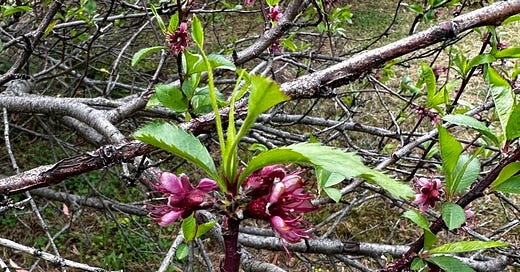Childlike, not childish
In this episode, we explore the not-so-simple question of what it means to be a ‘grown-up’
Over here, late-spring is arriving at last: the first blossom is long gone, but the leaves are sprouting anew, that odd rich copper-brown colour of the first-growth leaves on the pomegranate-tree fast turning to green. A small miracle, in its way; small changes at first that fast become larger ones. Seems there may be a metaphor there…
Yet it also reawakens an old question that’s been drifting around in my mind for a long time now: if everything is growing like this, at what point do we stop? We humans start as a single dot, growing and growing, then born, then a child, and eventually an adult - or a nominal adult, at least. Fully-grown and all that. Yet at what point do we become ‘grown-up’ - or, more subtly, with the addition of an ‘a’ indefinite-article, ‘a grown-up’? What exactly is ‘a grown-up’? And, if we look at that state, or status, or whatever it is, to what extent does it - or should it - differ from the world and worldview of a child?
A reminder of that point came up for me earlier this week whilst I was watching a YouTube video ‘I don’t know how to be an ‘adult’ in this world’, by TheCottageFairy. “I failed at ‘growing up’”, she says, wandering quietly barefoot through a small forest, white springtime flowers carpeting the forest floor, then crouching down to work on a watercolour painting for her shop; “I talk a lot about imagination, I read books meant for children, I’m a childish individual”.
‘Childish’? I disagree, respectfully: what she does is childlike, not childish. There’s a difference; a very important difference…
To be childlike is to see the world as always something new, alive, growing; to meet the world with wonder; to see creation, and to create ourselves; explore, exploring, always; greet everything, and everyone, with playfulness, joyfulness, ‘the everyday exuberance of ordinary life’.
To be childlike is to care about everyone, everything; to want to know about, and for, everyone, and everything; to be excited about, and for, everyone, everything.
To be childlike is to know that play is work, that work is play. That each can succeed only when both are the same; that play on its own goes nowhere, that work on its own becomes lifeless, drudgery, death.
To be childlike is to know - not merely ‘believe’ - that magic is exists, is real, is everyday. Magic occurs whenever we create something from nothing, as the woman does with her painting in that video. Magic occurs with everything we create - including every technology, of course: “any sufficiently advanced technology is indistinguishable from magic”, said Arthur C Clarke, though perhaps missing the obvious corollary that any sufficiently advanced magic is indistinguishable from technology. Magic, being magical.
For as long - yet for only as long - as we can see the world, and be the world, with childlike eyes, then the caring will still be there, the knowing with still be there, the magic will still be there, everywhere around us.
And miracles, too, like the leaves sprouting at last on the trees.
The contrast: to not be childlike, but childish.
To be childish is to see only oneself; to see the world an object to be possessed, a subject that exists solely to the serve the self, without question; to meet the world with anger, fury, hate; to destroy, for the sake of destroying; to explore nothing; to make misery of everything.
To be childish is to care about no-one, and nothing; to want to know nothing about, or for, anyone, or anything; to be excited about nothing, other than in how it may be entrapped to serve the self.
To be childish is to see play and work as separate, to be forced apart; to demand that they alone may play-without-work, forever, and that work-without-play is something that only others must do.
To be childish is to see nothing of the magic of the world, but demand instead that the world must serve each childish desire ‘like magic’, at no effort of their own.
What we call ‘childishness’ is the outcome of a wilful refusal to grow up beyond the toddler-tantrums of ‘the terrible twos’; an imagined ‘right’ to forever remain a childish covert crybaby, forever self-centred, forever demanding, forever complaining; forever possessive, mine mine mine not-yours not-yours not-yours if i can’t have it no-one can; a perennial, pandemic paediarchy, forever-festering clueless conspiracy-laden cults, each consuming the world in their own ways ever closer towards oblivion.
Whichever way we look at it, Not A Good Idea…
It’s hard to stay childlike in a world like ours; hard to avoid being forced back into the same childishness that that infects everyone else, infests everywhere else. Yet we do it anyway, as best we can. If only because the alternatives are so much worse…
To be childlike is the responsibility of a child. To still remember how to remain childlike is the responsibility of a child growing into a true adult.
To be childish is the refusal of that responsibility, the rejection of that responsibility. To stay childish is the irresponsibility of a child growing only into an adulterated never-adult.
To be childlike, not childish: that choice is so important now, for the fast-changing world that we face.



